|
|
Chapter Eleven: A New Band & Greatest Hits (1983)
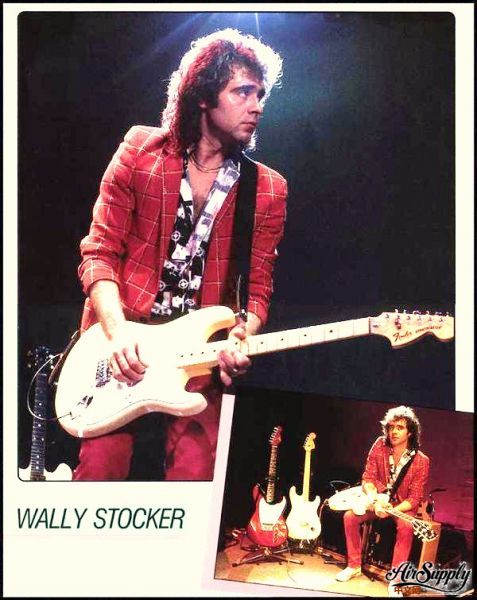
The new year brought many changes for Air Supply. Don Arden felt it was time for a major shakeup within the band, so in March, Rex Goh, David Moyse and David Green were asked to leave Air Supply. Arden was convinced that Russell and Graham would see significant financial gains if they existed as a duo, using hired musicians for touring.
“I was told to leave Air Supply in March,” said Rex Goh. “Don Arden used to manage Electric Light Orchestra, and he with Graham and Russell decided that it was best for the two of them to remain as singers and use session musicians to back them up. Air Supply was not a band anymore. It was just the two of them. It’s not easy for a seven-piece band to earn a lot of money. It’s a lot more beneficial for a few to remain and hire the rest as sessionists. Graham and Russell realized that they would earn more money hiring sessionists. The money that we got was shared equally among all the Air Supply members. If we did a big tour in the United States, say, a four-month tour, each of the seven in Air Supply got between $20,000 and $30,000. However, if there were just two members and the rest are hired musicians, the two members would get about $85,000 each. So you see, the reason is strictly monetary. And I’m talking about millions. It just gets out of hand. Air Supply has been through a lot of court battles. We’ve been through too many as a result of changing managers. Yes, you could say I was asked to leave Air Supply because the two singers wanted a bigger share of the pie. That’s business. The sad thing is that I liked touring and I miss that and, of course, the money. I got the chance to meet many famous people like Aretha Franklin, Gino Vannelli and played with Glenn Campbell in his show. Once I had a police escort for my boots from the hotel to The Greek Theater where we were performing so that they would arrive in time for my performance. But no, I don’t miss Air Supply’s music. Anyway it’s time for a change after being with them for four years.”
In early April, Air Supply held auditions in Los Angeles, where musicians from all over the States flaunted their skills in front of Air Supply and their management team. Don Cromwell, a bass player living in L.A., went through several auditions with his friends, drummer Kirk Arthur and guitarist Paul Kingery, but only Cromwell made the final cut. “I think Air Supply was looking to add a little swagger and a little energy,” said Cromwell. “Don Arden told me at a party once that he had watched Air Supply on the Live in Hawaii HBO special, and he wanted to replace the whole band. He thought they were too sedentary [on stage]. I was playing with the group Wet Picnic and other bands, and doing a lot of recording for Unicorn Records. My roommate at the time, Paul Kingery, said that Air Supply was in town and was looking for musicians for their new tour. ‘Let’s put together a rhythm section and go audition.’ So in the meantime, I had a gig at a club in Studio City in Southern California with Cynthia Manley. So we go up on stage and I see Graham Russell from Air Supply [in the audience]. So we did our thing and played great. After the show, Graham comes up and taps me on the back and says, ‘Hey mate, can I have a word with you? I can’t guarantee you the job because I have a partner, but come audition.’ So I went with Paul and a group of guys and we learned six Air Supply tracks, and we really sounded great. They stopped us after a few songs and the road manager said, ‘Can you come back at two o’clock?’ So we came back and played three songs, and were asked to come back tomorrow at noon. So the next day they had a whole new group of guys, and that was the band they wanted to assemble.”
Existing band members Ralph Cooper and Frank Esler-Smith were rehired as touring musicians. Guitarist Steve Farris and keyboardist Ken Rarick won spots in the band, with Farris replacing the guitar duo of Rex Goh and David Moyse. Rarick, the youngest member of the band, had played piano in high school jazz bands, before joining several local rock and roll groups. Farris had played with Eddie Money for three years before forming the band Mr. Mister in 1982.

Steve Farris (Left) with Mr. Mister
Shortly after the Air Supply touring band was finalized, contract negotiations between Steve Farris and Arden broke down. “Steve Farris, a fabulous guitar player, was just getting started with the band Mr. Mister, and they were just kind of breaking,” said Cromwell. “Steve put a price on himself for the [upcoming] Air Supply tour that they just didn’t want to meet. So here is Air Supply, two weeks away from leaving on a world tour, and they didn’t have a guitar player. So every guitar player in L.A. was coming out of the woodwork, and people were calling me and asking if I could get them an audition. These guys would come in and they would know the songs note for note, and play the songs perfectly. Graham would say, ‘No, he’s not right.’ Later, I was in the lobby [at Burbank Studios] and Graham’s got one hand on the phone and says, ‘Don, do you know a guitar player named Wally Stocker? He’s in Detroit and wants to come and audition.’ So the next day Wally comes walking in, a Keith Richards clone [who had played with Rod Stewart and The Babys], and is asked to play ‘Sweet Dreams.’ Wally says, ‘How does that one go?’ So they asked him to play ‘Lost In Love,’ and he says, ‘I don’t know that one.’ So here is the guy who is the least prepared and he gets the job.”
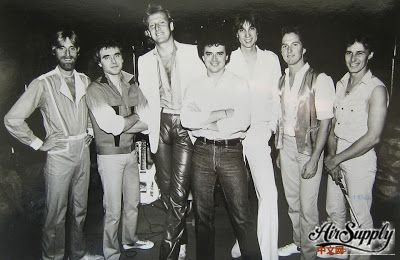
(L-R) Frank, Wally, Graham, Russell, Ken, Don, Ralph
Graham and Russell were no longer living with their significant others. Graham and his girlfriend Chrissie, who had inspired many of Air Supply’s early love songs, broke up. During the North American tour on July 2, 1982, Graham met a seventeen-year-old American named Jodi Varble, who won tickets and backstage passes from a local radio station for an Air Supply concert in Rockford, Illinois. After the show, Varble made an unforgettable impression on Graham, and they became long-distance friends. Graham was 30 in 1982, and admits to having had a preference for older women in the past. “I am fond of older women,” he said. “They’ve just always appealed to me. Perhaps even 40 years old. Jodi and I wrote to each other for several years before we went on a date. We saw each other again in 1983 and have been inseparable since then. She may have won the contest, but I got the prize. [Looking back] it’s rather embarrassing how young she was. But when you know it’s the right person, you make a concerted effort to make it happen. When we first met we knew there was something special going on.” Jodi started modeling at age 15 in Chicago. Her first job was a runway show for Mattel toys as Angel Face Barbie. She was Miss Illinois Teen All American in 1983.
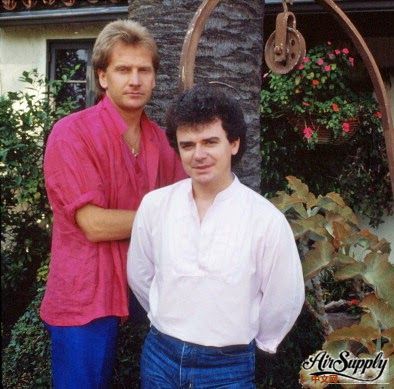
Russell and his wife of three years separated and divorced. The constant touring proved too difficult to overcome. “You know, the reason my second marriage split up was because of the business,” said Russell. “It really is hard. It’s virtually impossible to maintain a normal life while you’re on the road. I used to see my wife two or three time a year. We couldn’t sustain a marriage that way. I was shocked because I thought it would last forever, but I was away too much and she moved out. I’m a believer in fate and I’m happy now. I’ve always been optimistic about love, because if you can’t get it right, then you have to keep trying.” Russell met an airline stewardess named Paula Fulmer, who was working a flight the band was on while traveling between cities in California. They started dating soon after. “We met on a plane, he said. “When she asked me what I did for a living, I said ‘Air Supply.’ She shoved an oxygen mask in my face! In show business, it pays to have someone who can show you where the exits are.” Russell noticed Fulmer on subsequent flights and also in the airport. “I saw her sitting on a suitcase, and I thought she looked nice, but it was no big deal,” recalls Russell. “But the thing that got me was that when she came to that first concert, she was in civilian cloths with her hair down, and she looked amazing!”
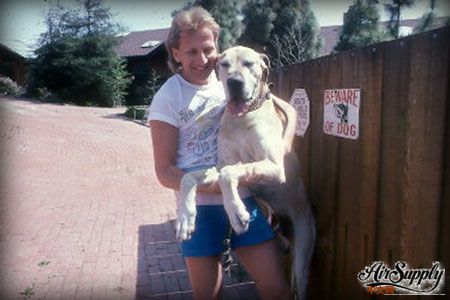
Graham & Jet
Air Supply was now Don Arden’s main cash cow, and together they were very successful. But Arden lost his Hollywood mansion in 1983, and in the aftermath, Graham adopted his daughter’s Great Dane named Jet. Sharon Osborne explained the event in her 2005 autobiography titled Sharon Osborne Extreme: “The next time I was in L.A. I had a meeting with the European Asian bank, which had financed the purchase of the Howard Hughes house six years before. They were based in Singapore, and this was one of the deals I had signed for my father. The loan was huge because he’d had no capital and no collateral. All he had to do was pay the interest on the loan. This unusual form of unsecured mortgage came courtesy of an ‘arrangement’ he had with one of the managers. In exchange, this man would come over to California every year and stay at the house, where hookers would be laid on, and he’d get to meet this star and that star - people like Tony Curtis and other friends of my father’s. So for years this bank manager had covered my father’s arse, but then loses his job and the auditors go in and basically my father is busted. They told me that in the six years he had the house, he had only made one of these payments: $50,000 on a $1.7 million loan. The unpaid interest was, of course, added to the original sum borrowed and now it was pay-up time. As my father didn’t begin to have that sort of money, the bank had no option but to repossess the house, they said. My father wanted nothing there of mine, including my animals: Jet was given to Air Supply.”
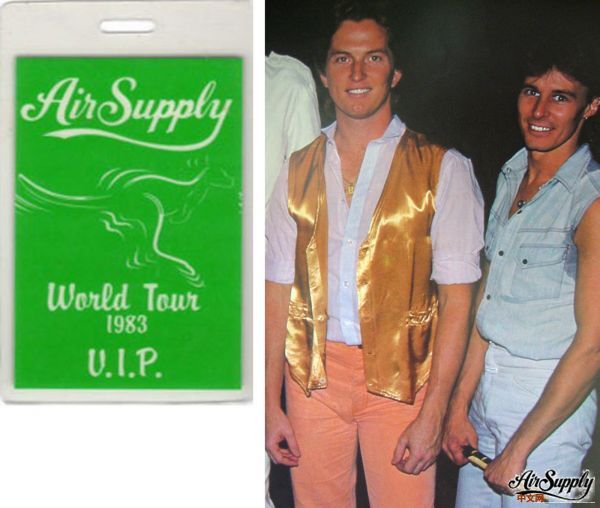
Don Cromwell (Left)
Air Supply planned an ambitious tour in 1983, with 80 dates over seven months, making it the longest tour of their career. The extended tour was possible because Air Supply decided not to release an album of new material in 1983, primarily because their busy tour schedule in 1982 left them no time to record new songs. “It’s a matter of time, that’s for certain,” said Russell. “We got back [to Australia] October 6th last year. We’d toured for four months, and you need a month or two to get over something like that. There just wasn’t the time to put into recording.”
Clive Davis and Don Arden both suggested that Air Supply release a greatest hits album, but the band was hesitant. “We thought it was a little early, as we only had three albums out,” said Graham. “But Clive said, ‘No, we need to put it out.’” There is often a stigma associated when bands release a hits package before they have ‘earned’ the right to do so. In addition, a hits package can be a letdown for hard-core fans, who have eagerly waited to hear new material. But Davis had a proven track record. Air Supply had seven big hits in North America, and were labelled by Billboard as the most successful band of the 80s. Furthermore, greatest hits albums are often a lucrative endeavor for record labels because there are no additional recording costs, since they are assembled from existing recordings - although the addition of one or more new recordings is not unusual and can run up costs. “Although they’d only had three Arista albums,” said Davis, “we thought by 1983 that there were enough giant singles to warrant a greatest hits collection.”
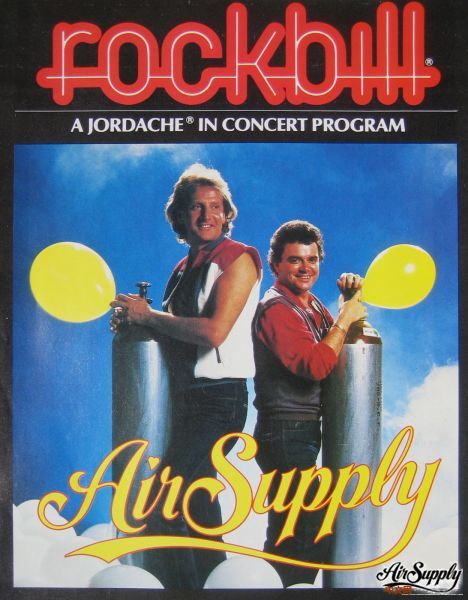
Unfolds to 17"x22" Poster
A new trend was emerging in the 80s, which featured corporate America and the music industry joining forces to create a music-marketing epidemic. Most advertising dollars in the 70s went towards sports marketing, as corporations were leery of the music business, and its not-so-politically correct reputation. This all changed when Pepsi invested $5.5 million towards a series of ads featuring Michael Jackson. The actual return on the investment is impossible to determine, but the impact of these ads was monumental for Pepsi. Coke soon responded with a campaign featuring Duran Duran. The competition to sign the top bands was fierce because available performers who were popular enough were being snapped up quickly. Rod Stewart was signed to Canada Dry, Eric Clapton to Camel, and rock group Triumph signed with Converse sneakers.
Jordache, a top producer of jeans, was looking to sign a band to promote their 1983 back-to-school campaign - its biggest sales period. They wanted a band that was touring right before the kids went back to school, and wanted to make sure parents would not be offended by the image the musicians would convey. Air Supply was clean-cut, pop-oriented, and were already very popular with the jean-buying teen-age audience. Joan Falcone, special-events coordinator for Jordache, recalls how important is was to pick the right band. “You can’t pick a group with a one-time hit, or a breaking song, or one that will damage your image. There are maybe ten or a dozen groups worth getting involved with,” said Falcone. Jordache and Air Supply agreed to a deal in which the band’s 1983 tour of America was sponsored by Jordache. Financial terms of the deal were not made public, but it was common at the time for sponsors to cover the entire cost of a tour. In return, Jordache’s name was featured in pre-concert advertising and appeared on all promotional material associated with the tour such as T-shirts and programs. A Jordache-sponsored poster of Air Supply was given to fans during the U.S. tour.
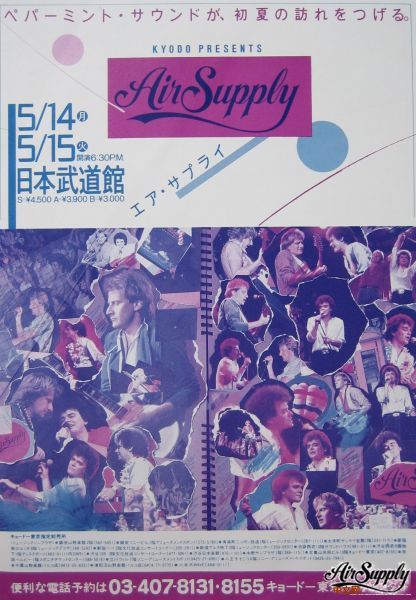
Japan Promo Brochure - May, 1983
Air supply began the 1983 world tour in April, with many sold-out concerts in Japan, Hong Kong, Taiwan, Bangkok, Manila and Australia. The band had a few days’ rest at home in Australia, before flying back to America to prepare for a 53 city tour with 69 dates. The tour started in Canada on May 18, and was expected to end in the States in September, but was extended into October because several shows were rescheduled due to illness. A June 15th concert in Albany, New York, was cancelled mid-performance because Russell lost his voice. Many unhappy fans were left crying at the box office after learning the show would be rescheduled. The lengthy tour was exhausting for the band. “We have to do a lot of overnight traveling just to get to all the cities in time,” said Russell. “It’s quite difficult. We get a bit bumped around, especially when we have concerts back to back in separate cities, but if we get four or five nights sleep in a regular bed, we feel OK. Nothing exciting ever happens to us. We just keep going, just like clockwork..”
While in the midst of their 1983 World Tour, Air Supply made a special appearance in the 198th Annual Fourth of July Parade in Bristol, Rhode Island. Scheduled for two concerts in Warick, Rhode Island on July 5 and 6, Air Supply were the celebrity guests of Providence radio station WPRO-FM. Along with on-air personalities from WPRO, Air Supply rode on a station-sponsored float that was equipped with loud speakers, playing the band’s music along the 2.2 mile route. Bristol had a population of only 20,000, but the parade, the largest and oldest in the country, drew over 300,000 spectators. The parade was broadcast live by the local CBS-TV affiliate.
The current tour was just the first of many for bass player Don Cromwell; “We had a saying in Air Supply: ‘Once you pack you never come back.’ We would be gone for a very long time. The trucks and buses are all out there and the promoters get into a groove. It was a real grind. Then once we got home, we got something we called road shock. We would come home and have to stand in line at the grocery store and thought, ‘Is no one making my food for me? Nobody’s taking my bags to the truck?’ The road is something that, unless you have done it, it is really hard to explain it completely.”
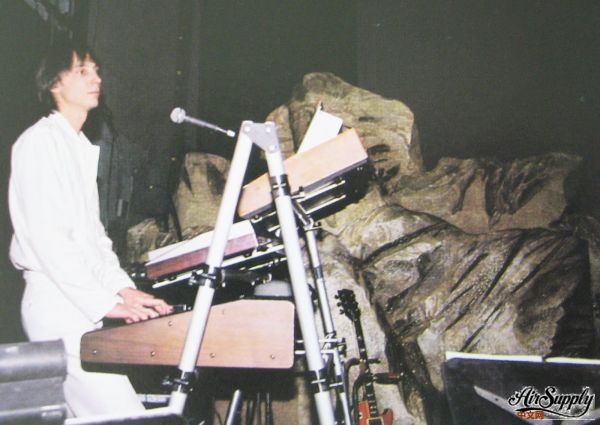
Ken Rarick with Desert Rocks
To help cope with their lengthy tours, Air Supply employed a band assistant to help with everything from backstage setup, stocking the bus with food and alcohol and handing out backstage passes. During the summer tour of the States in 1983, they hired Craig Duswalt as their personal assistant. “I was working as a runner at the Westbury Music Fair,” said Duswalt. “Bands would come into town and I would pick them up at the airport or their hotel and bring them to the gig. Unbeknownst to me, Air Supply had just fired their band assistant because of excessive drug use. Air Supply did a show on Friday night, I picked them up at the hotel, got them coffee, made sure they were comfortable. After the second show on Saturday night, I was backstage when Air Supply’s security guard, Bob Street, asked my salary. I told him about $150 a week. Bob said, ‘Do you want to quadruple that?’ I was told they needed a person to take care of their backstage area [on the road]. They offered me a job with them on their world tour. The next morning a limo took me to the airport and I flew to Connecticut to meet the band. That was my first day of a six-year world tour.
Craig Duswalt talked about some of the benefits of touring with Air Supply in his 2014 book titled Welcome To My Jungle: “Let me set the record straight. Contrary to some beliefs, most of the members of Air Supply in 1983 were not gay. The only gay member of the band was their very talented keyboard player, Frank Esler-Smith. One of my ‘jobs’ for Air Supply was to invite beautiful woman backstage to keep up the image of a rock band having lots of woman around at all times. The great thing about Air Supply was that they attracted about 86 percent woman to their shows. Not that they would do anything with these girls - heck, most of them were married. But that’s another book for another time. Anyway, I would hand out the backstage passes to these beautiful woman so that they could meet the band. One of the requirements for getting backstage was that they had to wear the pass on their shirt over their left breast. Sometimes the woman asked me to put the backstage pass on for them. And so I did. (Hey, I was twenty-one - give me a break!) I did make double sure I had their permission first.”
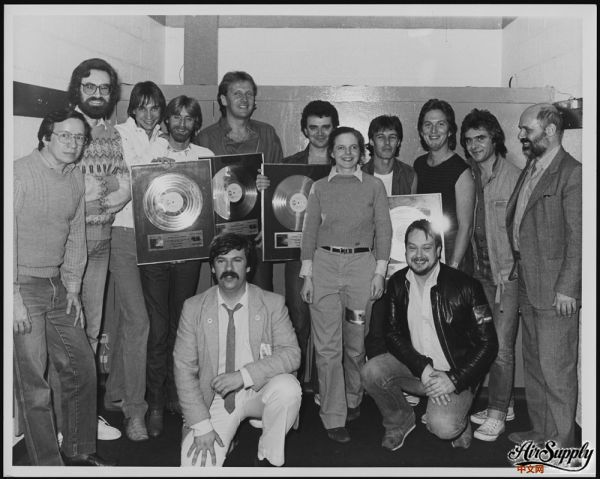
'Now And Forever' is Platinum in Canada - Montreal (June 1, 1983)
The 1983 tour featured the same desert rock stage setup used during the successful run in 1982. Because the group had spent a considerable amount of money on its creation, it made sense to extend its shelf life. There was other improvements that made the current tour the most impressive yet. “We have what they call in the commercials a ‘new, improved’ laser show,” said Russell. “It has twice the power we had last year and we’re using four colors, which looks really spectacular as opposed to just one. We have some computerized animation which is projected onto a screen behind the set. We went to the [laser lighting] company and said, ‘Show us what you think you’ve got for us.’ At some things we said, ‘No, that’s totally wrong for us.’ We narrowed it down to the things we felt would enhance the music rather than overshadow it. It was quite a process to get to the stage we’re at, but we feel that everything we’ve got now doesn’t detract from the music.”
On stage, the new band members brought a tougher image and sound, just as Arden had envisioned. “Wally brought just the perfect touch of rock,” remembers Don Cromwell. “Ken and Frank were perfect compliments. Ralph knew the music and the girls used to love him. Russell used to amaze me day in and day out with his vocal ability. Plus, the power of playing live with [so many] hit songs just makes things happen.”
Despite the stage enhancements and new band members, concert reviews were mixed:
The B-side to ‘Making Love,’ however, will have many Air Supply fans pulling their hair. ‘Late Again’ is another of the group’s vain and labored attempts at rock. It ranks with ‘Can’t Get Excited’ as two of the group’s most forgettable but unforgivable quasi-rock tunes. Both songs feature good guitar licks and creditable drum work, but somehow just aren’t believable when sung by Air Supply. - Pittsburgh Press
You might as well forget the hype that surrounded the show. It was, you’ll recall, heralded as having the finest lighting and most elaborate set since Cecil B. De Mille retired his director’s chair. Not so. Argon Inion laser systems, 3-D sculptures, diffraction holograms and cyclorama screens are all very well, Jack, but you hardly ever used them. A band as faceless as Air Supply can use all the distractions it can muster. - Montreal Gazette
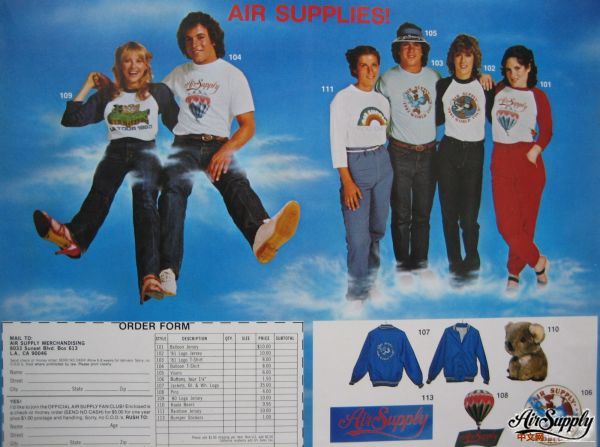
Fan Club Merchandise
As the show works up to a climax, the group sings one of its best songs (‘Can’t Get Excited’) and suddenly the stage and the house explode with laser effects and the cyclorama becomes a huge drafting board with fascinating light designs in computer-generated graphics. It is not possible to describe how exciting and enthralling this five-minute sequence was, but it was better than any 40-minute Fourth of July fireworks display could ever be, concentrated and projected onto a 20-by-80 backdrop. - The Evening Independent
Air Supply experienced more legal concerns in early 1983, when the band’s L.A.-based North American fan club, founded in 1981, was forced to close without notice. (Air Supply’s Australian fan club started in 1977, and was operated out of Double Bay, a suburb of Sydney.) The North American fan club was responsible for mailing band updates to members, and selling official Air Supply merchandise, such as T-shirts, jackets, hats, buttons and even Koala bears. Fan club information was available in music trade magazines, album inserts and at live concerts. The folks running the fan club failed to realize that all clothing bearing the band’s name was required to be produced by Winterland Productions, the largest screen-printer and distributor of concert merchandise in North America. Winterland had signed a merchandising deal with Air Supply, so they sued the fan club for unauthorized use of the rock group’s name because the club sold T-shirts not made by Winterland. The club quickly shut down, and some customers with pending orders never received their merchandise. Outstanding orders were later credited. In August, the fan club quickly reorganized, and the first official newsletter from the new club was mailed to fans in September.
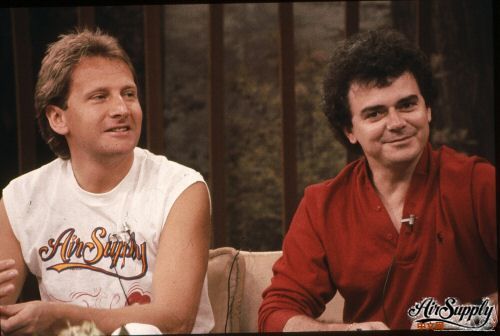
TV Interview with AM Cleveland
The Air Supply international fan club opened in 1982 and had thousands of members from all over the world. A newly formed Taiwan chapter of the club got off to quite a start when Graham and Russell officiated over the first meeting with over 4,000 members in attendance. The meeting was held at the venue where Air Supply performed that night. Much to Graham and Russell’s surprise, many of the club members who came up onstage to shake hands with them, also gave them a gift. “The gifts were extraordinary,” said Graham. “Hand-painted pictures framed in gold, hand-made pottery and tea sets, all just beautiful!” The band was in an awkward position because there were far too many gifts to even think about taking them home, much less getting them through customs. Ultimately, the gifts were ‘re-gifted’ to fans backstage after the concert that night. “It was either that or open the ‘Air Supply Made in Taiwan Gift Shop,’” joked Russell.
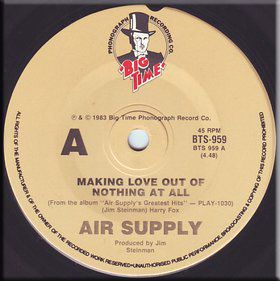
Australian Pressing - Big Time
On the advice of Don Arden, Arista purchased a song written by Jim Steinman called ‘Making Love Out Of Nothing At All.’ Arden and Clive Davis both wanted at least one new song on the hits compilation, which was not a common practice with greatest hits albums at that time. “[My son] David and I had come up with the concept of having a new hit on there,” said Arden. “It was the perfect vehicle to really sell the compilation.” Steinman was well known in the music industry for his rock-opera style recordings. He had written two songs for singer Meat Loaf, but Meat Loaf’s recording company did not want to pay for the high-priced songs. In addition, Steinman and Meat Loaf were involved in a legal dispute and were not on good terms. Meat Loaf’s loss was Air Supply’s gain, as they got ‘Making Love Out Of Nothing At All’ and Bonnie Tyler got ‘Total Eclipse Of The Heart.’ Meat Loaf was upset when he discovered that other artists were recording the Steinman songs. “They don’t understand it,” he said. “They don’t get it. No one gets it like I get it. The bottom line is that when other people do a Steinman song, it never comes off like when I do it. I am in that music, and Jimmy is in my vocal style. Everything we do, we still carry each other, whether we work together or not.” The original demo of ‘Making Love Out Of Nothing At All’ was sung by Canadian Rory Dodd, and has recently surfaced on the internet after being discovered on a Jim Steinman cassette at the New York Public Library. Dodd was credited with singing backup vocals on the Air Supply track.
Graham and Russell recorded ‘Making Love Out Of Nothing At All’ at The Power Station in New York City. Steinman produced and directed the track, and used hand-picked musicians; Max Weinberg (drums) and Roy Bittan (keyboards) from Bruce Springsteen’s E Street Band, and 70s rocker Rick Derringer (guitar). It was an all-star cast, that took a song originally over twelve minutes, and turned it into a five and half minute masterpiece. The single was cut down even further to a radio-friendly four and half minutes. “I did want to add one new exclusive single to the album,” said Clive Davis, “and I turned to the premier maker of grandiose songs epics, Jim Steinman, who had created the Meat Loaf album ‘Bat Out Of Hell’ and had most recently written and produced ‘Total Eclipse Of The Heart’ for Bonnie Tyler. I thought his flair for musical melodrama and the expressive voice of Russell Hitchcock would be an ideal match, and the result was one of the biggest singles of Air Supply’s and Steinman’s career, the number-two ‘Making Love Out Of Nothing At All.’”
“[Working with Jim Steinman was] a very interesting experience,” said Russell. “We met him in New York - for some reason he wanted to meet in an ice cream parlour. I remember he wore sunglasses and black leather motorcycle gloves, which he didn’t take off once, all through ice cream and coffee. He played us his song, and of coarse the version he gave us had twelve or fifteen verses and went on for about a day-and-a-half. We had to cut it down quite substantially. But he seemed very understanding, considering. [But] he said we were the most boring guys he ever met. To which we say, (expletive) you. He only met us twice.”
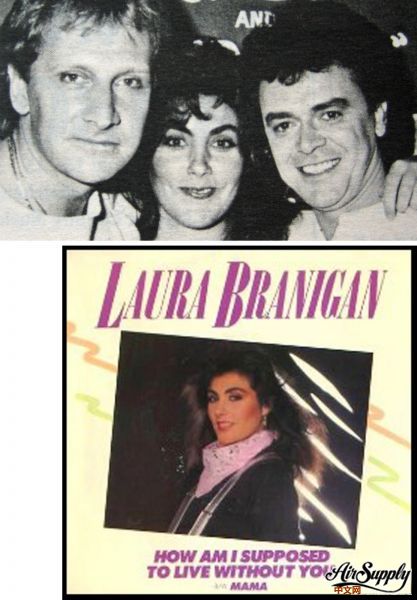
Arista considered adding two new singles to the hits compilation, one of those being ‘I Can Wait Forever.’ It was to be released in May as the lead single, but was shelved after Arista decided to save it for another project. ‘Making Love Out Of Nothing At All’ was instead chosen as the lead single and it was released in July. By August, it was #2 on Billboard, kept out of the top spot by Bonnie Tyler’s Steinman-produced ‘Total Eclipse Of The Heart.’ ‘Making Love Out Of Nothing At All’ was a global hit, but its high of #45 in Australia, and #80 in the U.K., was disappointing. A special 12” full length extended version (5:37) was released in the U.K., and featured the songs ‘Late Again’ and ‘All Out Of Love’ on the flip-side.
A rarely-seen promotional music video of ‘Making Love Out Of Nothing At All’ was filmed, but was later scrapped because Arista felt it was not strong enough. It featured the storyline of a soldier returning home to his significant other, with clips of Graham and Russell interlaced throughout. A second video, filmed in and around Don Arden’s Los Angeles estate, included Jodi Varble in a lead role. “I remember shooting [the original video], but I’ve never seen it!,” said Graham. “We did it in Battery Park, and it was a night shoot, and it just felt a bit strange. It started to rain and they had to cancel the shoot and carry on the next day. We were playing in New York at the time, and they finally said that they were going to can it. They agreed that it just didn’t feel right. I know they did finish it up later, but I’ve never seen the finished video. They decided to go for a totally different concept with the other video. They chose me to be the leading guy, which I really resisted. However, I was very pleased about it because the lady who plays my love interest in the video later became my wife. The video was going to be shot in Los Angeles, and they couldn’t find the right person for the love interest. They had auditions, but they couldn’t find someone they thought would fit me. I thought that was strange that they couldn’t find someone in all of Los Angeles, but they asked me if I knew anybody. I had been corresponding with this lovely young girl in Chicago named Jodi. We’d been writing, but we’d never been on a date, so I showed them a photo of her. They flew her out, and she tested for the part and got it. It rained in Los Angeles during the time we were supposed to shoot, so we went to Utah because we had shows there. The whole shooting company came out there. Jodi came too, and during the shooting we became inseparable. We fell in love during the shoot. The director wanted us to pretend like we were in love, and I didn’t have to pretend anymore! My favourite shot of that video is when Jodi is on the roundabout going around, and the camera follows her. I think it’s such a beautiful shot. It really captured her nature, her youth, her vitality, her spirit.”
Arista had a terrific track record with regards to guiding the career of Air Supply, but in 1982 they lost a hit song to Laura Branigan. Arista had won the rights for Air Supply to record a song written by Michael Bolton and Doug James called ‘How Am I Supposed To Live Without You,’ but Clive Davis insisted on changing the chorus. CBS Songs executive, Harvey Shapiro, knew the song would be a huge hit when Bolton and James first wrote it, and was elated when Air Supply put a hold on it. “We were excited because Air Supply was selling millions of records,” he said. “We kept waiting for the thing to come out. One afternoon, I got a phone call saying, ‘Congratulations, Laura Branigan’s cutting your song this afternoon.’ I was frantic because I hadn’t done a lead sheet yet. But they went ahead and cut it from tape.” While Davis and the songwriters argued over the change in lyrics, Laura Branigan recorded her own version, knowing that she and her management team would be wasting their money if Air Supply released it. When Arista declined the song, Branigan released her version in July, 1983, and it went straight to #12 on Billboard Hot 100 and #1 on the Adult Contemporary chart.
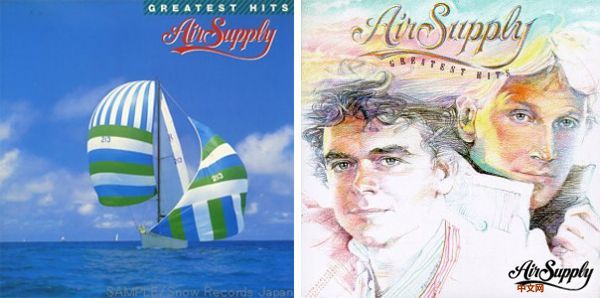
Japan Release U.S. Release
The ‘Greatest Hits’ album was released on August 1, 1983. Most of the world got a 9-track version, which included the band’s most famous album cover, a hand drawn sketch of Graham and Russell by artist Linda Fennimore. A year later, Fennimore did the artwork for Billy Ocean’s album ‘Suddenly,’ which reached #1 on Billboard Hot 100 record chart. Fennimore’s contribution to Air Supply’s ‘Greatest Hits’ was a last minute decision. Arista had already chosen artwork conceived and painted by Australian artist, Brett-Livingstone Strong, best known for his bronze statue of John Lennon and stone sculpture of John Wayne. The front and back album cover painting by Strong, done in pastel watercolours, was a surrealistic landscape image of the Australian outback and incorporated a kangaroo, a heart, and Graham and Russell into the setting. Air Supply and Strong were brought together by a mutual friend who knew that the artist was a great fan of the group’s music. “We were knocked out when we saw what Brett had painted,” said Graham. “It was very striking, a very unusual painting, but very representative of the music inside.”
Big Time Records and EMI released ‘Greatest Hits’ in Australia with a different track list. Comprised of 13 tracks, it included the Aussie singles ‘Love and Other Bruises,’ ‘Now and Forever’ and ‘Bring Out The Magic.’ Fan favourite, ‘Chances, was included on all versions of ‘Greatest Hits’.’ “It never was a single for us, but it was so popular everyone thought it was,” said Graham. “I have always loved this song, it is so vulnerable, and so very haunting. I remember writing it in a bedroom in a house that I had stayed at for a few days. I pictured a man and a woman, but the man was really uncertain if the woman was going to show up on this date. It’s about all the chances you throw away by doubting.”
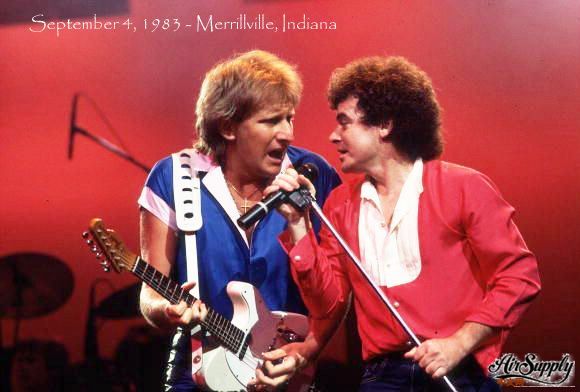
RKO Radio Networks - Live Broadcast Sept. 4, 1983
Initial sales of ‘Greatest Hits’ were very strong, and Graham remembers how proud he felt each time he drove past a particular billboard sign promoting the album. “Clive had a large billboard on Sunset Boulevard, and it had the total sales every week. Somebody would cross it out and put more up. I used to watch it, week after week, and it was so bizarre to see that up there. I used to think, ‘God! That’s me up there!’ I don’t consider myself a celebrity or pop star or anything like that, so to see something like that, to me was really weird.” ‘Greatest Hits’ achieved double platinum in Canada (200,000 units) and the States (2 million units) before the end of the year, and the Jim Steinman produced ‘Making Love Out Of Nothing At All’ single was gold certified (over 1 million copies sold).
“‘Making Love Out Of Nothing At All’, together with the other hits, showed we really had scored with major pop copyrights with Air Supply,” said Clive Davis. “They had truly registered with the public, and when banded together as Air Supply’s ‘Greatest Hits,’ the album soared over five million copies. That was the peak of the group’s popularity.”
Air Supply negotiated for Steinman to produce their next studio album, for which recording was to begin in February of 1984. But this collaboration never materialized because Steinman was suddenly swamped with production offers from other artists such as Black Sabbath, Barry Manilow, Asia and Rick Springfield. He declined Air Supply, and produced Billy Squire’s 1984 album ‘Signs Of Life,’ and a song on Barbara Streisand’s album of the same year, ‘Emotion.’
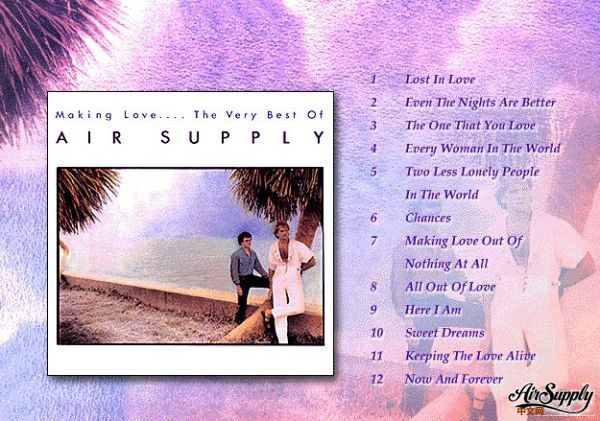
U.K. Release
Shortly following the release of ‘Greatest Hits,’ Arista released another variation of the record in the U.K., called ‘Making Love...The Very Best Of Air Supply.’ This album had different cover art, and included 12 songs. One of those tracks was the ballad, ‘Keeping The Love Alive,’ which was released as a single in parts of Europe two years earlier. The U.K. release was a far more complete collection compared to the more widely released 9-track ‘Greatest Hits.’
A fourth variation of ‘Greatest Hits’ was released in Japan by Arista and Nippon Phonograph. The record featured different cover art, and included 11 tracks. The huge Japanese hit, ‘I’ll Never Get Enough Of You,’ was wisely part of the collection. A live version of ‘Late Again,’ previously released as the B-side on most versions of ‘Making Love Out Of Nothing At All,' was also included.
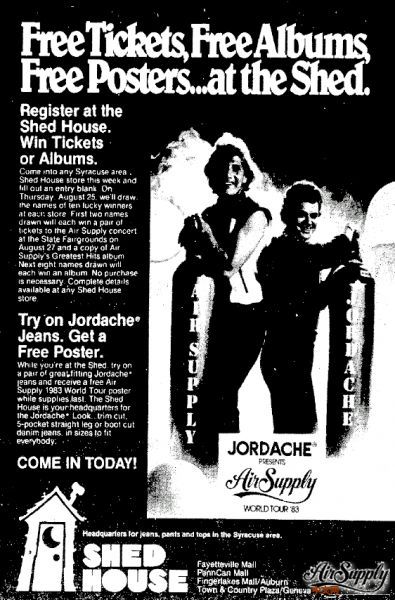
During the summer tour of the U.S., Jordache launched several campaigns in retail outlets. One involved enticing customers to try on a pair of Jordache jeans by giving them a free Air Supply poster. At some locations, customers who bought a pair of Jordache jeans received the ‘Now And Forever’ album, plus the poster. Air Supply made several in-store appearances, where they signed thousands of autographs. Many of these stores were mobbed by enthusiastic fans, and the allotted one hour time slot for autographs was nowhere near long enough to satisfy everyone. Jordache was ecstatic with the results of the entire campaign as the company gave away over 60,000 copies of the album, meaning they sold at least that many pairs of jeans. At a shopping Mall in Tampa, Florida, Air Supply sold out all of its records and 2,500 pairs of Jordache jeans. Joan Falcone of Jordache was amazed at how popular Air Supply was at the time, and not with just Jordache’s young target audience; “There were grandmas at the concert!” Jordache was impressed that Air Supply wore their jeans while playing live in concert. Most bands wanted nothing to do with their sponsor when they were outside the realm of the negotiated contract.
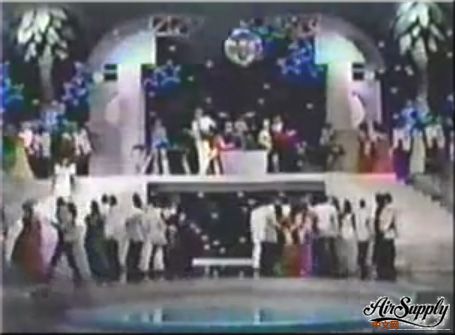
Miss Teen USA Pageant
On August 30, Air Supply performed at the Miss Teen USA Pageant, held at the Civic Center Arena in Lakeland Florida. The pageant was viewed by millions of Americans, as it was broadcast nationwide on CBS. Air Supply performed three songs, ‘Making Love Out Of Nothing At All,’ ‘Chances’ and ‘Every Woman In The World,’ while the contestants were introduced at different stages of the competition. Beauty pageants were extremely popular in the U.S. during the early 80s, so having the band perform was a testament of how popular Air Supply was in America.
Don Arden brought Air Supply into another marketing campaign, this time partnering with Air Florida in a promotion called the ‘Thanksgiving Day Giveaway.’ Passengers who flew Air Florida and departed from Miami International Airport on November 24 or 25, received a free copy of the smash single ‘Making Love Out Of Nothing At All.’ Passengers simply presented their boarding pass at Air Florida’s gate, and were handed a copy of the record.
The album, ‘Making Love...The Very Best Of Air Supply,’ was considered a smashing success in the U.K. and all over Europe. Air Supply made a concerted effort in 1983 to increase the bands popularity in the region. Graham and Russell performed their smash hit ‘Making Love Out Of Nothing At All’ on West German TV show Vorsicht Musik for a December 12 airing.
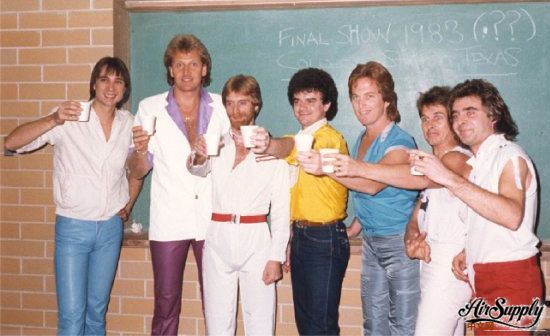
Final Show of 1983
As 1983 drew to a close, Air Supply reached a crossroads in their career. They were considered one of the most popular bands in the world, having earned significant wealth and fame, but it was impossible to deny that their popularity had slipped. They had lost creative control, and became entangled in a web of corporate politics and sponsorship.
“What is success?” asked Graham. “Real success is like Michael Jackson, with 25 million albums sold, where this current one of ours (‘Greatest Hits’) has sold about 3 million now. But when you consider that to 25, it’s nothing. So it’s all relative. I would like to be the best in our field. Bands like the Police are the best in their field, but you can’t compare them to us, as it’s totally different music. I think we can be the best in our field and I think we are close to that. We just need to tweak it a bit. I wish some things were different now. Everybody rings us up saying they’ve got a great song for us. That gets on my nerves. They say this guy wants to produce you, he’s real hot at the moment. There are some great producers out there, which is all cool, but we are not really into that. I do feel that over the last six to twelve months, the band has lost some of its identity, and lost a bit of its charm. We need to regain that on our next album.”
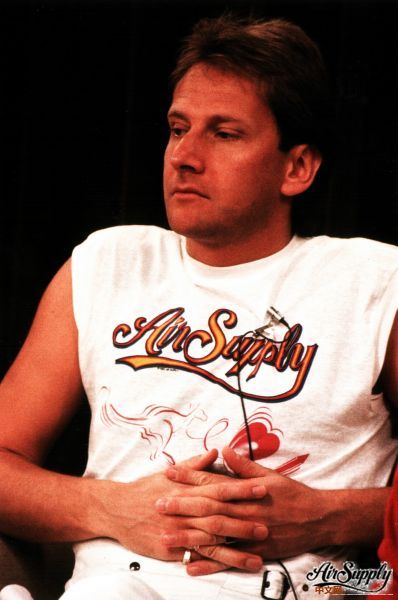
Clive Davis had extensive access to potential hit singles, whose authors wanted their songs played on radio. Consequently, many Air Supply singles were not written by Graham, and singer-songwriters resented being so well known for songs they hadn’t written. “My success in finding hits for Barry Manilow and Melissa Manchester had made me a lightning rod for publishers and songwriters who were hungry for artists who could take their music to the top of the charts,” said Clive Davis. “With a member of my A&R staff, I would meet with music publishers who would play us their best available new songs. The smart artists recognize the power of a breakthrough song, no matter where it comes from. They know such songs generate album sales and become centerpieces of their live shows, and they accept that there’s a trade-off in not getting publishing money. In the end, they win.”
Arista and local distributors had the largest influence on which Air Supply singles were released. They also chose the album covers. Graham and Russell knew the importance of album cover artwork, and they felt that hot air balloons and beach inspired scenes were not an accurate representation of the band. “For Air Supply fans, those early Air Supply album covers are iconic,” said Russell. “I remember we had a meeting with the art director of Arista for ‘The One That You Love’ album and he showed us two pictures of hot air balloons, and asked us which one do we like? It was really that crazy.” |
|